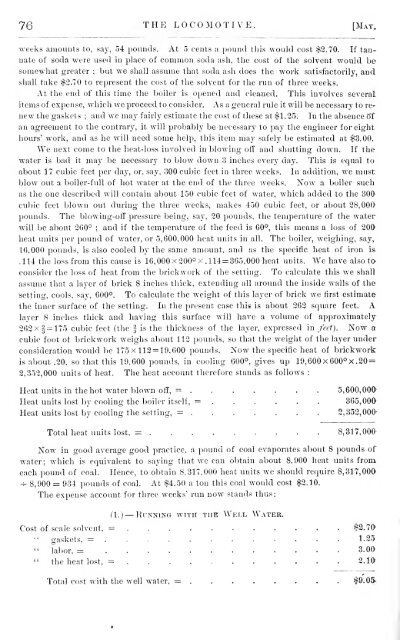The Locomotive - Lighthouse Survival Blog
The Locomotive - Lighthouse Survival Blog
The Locomotive - Lighthouse Survival Blog
You also want an ePaper? Increase the reach of your titles
YUMPU automatically turns print PDFs into web optimized ePapers that Google loves.
76 THE LOCOMOTIVE. [Mat,<br />
weeks amounts to, say, 54 pounds. At 5 cents a pound tliis would cost $2.70. If tannate<br />
of soda were used iu place of common soda ash, the cost of the solvent would be<br />
somewhat greater ; but we shall assume that soda ash does the work satisfactorily, and<br />
shall take $2.70 to rejoreseut the cost of the solvent for the run of three weeks.<br />
At the end of this time the boiler is opened and cleaned. This involves several<br />
items of expense, which we proceed to consider. As a general rule it will be necessary to renew<br />
the gaskets ; and we may fairly estimate the cost of these at $1.25. In the absence Uf<br />
an agreement to the contrary, it will probably be necessary to pay the engineer for eight<br />
hours' work, and as he will need some help, this item may safely be estimated at $3.00.<br />
We next come to the heat-loss involved in blowing off and shutting down. If the<br />
water is bad it may be necessary to blow down 3 inches every day. This is equal to<br />
about 17 cubic feet per day, or, say, 300 cubic feet in three weeks. In addition, we must<br />
blow out a boiler-full of hot water at the end of the three weeks. Now a boiler such<br />
as the one described will contain about 150 cubic feet of water, which added to the 300<br />
cubic feet blown out during the three weeks, makes 450 cubic feet, or about 28,000<br />
pounds. <strong>The</strong> blowiug-off pressure being, say, 20 pounds, the temperature of the water<br />
will be about 260° ; and if the temperature of the feed is 60°, this means a loss of 200'<br />
heat units per pound of water, or 5,600,000 heat units in all. <strong>The</strong> boiler, weighing, say,<br />
16,000 pounds, is also cooled by the same amount, and as the specific heat of iron is-<br />
.114 the loss from this cause is 16,000 x 200° x .114=365,000 heat units. We have also to<br />
consider the loss of heat from the brickwork of the setting. To calculate this we shall<br />
assume that a layer of brick 8 inches thick, extending all around the inside walls of the<br />
setting, cools, say, 600°. To calculate the weight of this layer of brick we first estimate<br />
the inner surface of the setting. In the present case this is about 262 square feet. A<br />
layer 8 inches thick and having this surface will have a volume of approximately<br />
262 X 1 = 175 cubic feet (the f is the thickness of the layer, expressed in feet). Now a<br />
cubic foot of brickwork weighs about 112 pounds, so that the weight of the layer under<br />
consideration would be 175x112 = 19,600 pounds. Now the specific heat of brickwork<br />
is about .20, so that this 19.600 pounds, in cooling 600°, gives up 19,600x600°x.20 =<br />
2,352,000 units of heat. <strong>The</strong> heat account therefore stands as follows :<br />
Heat units in the hot water blown off, = 5,600,000<br />
Heat units lost by cooling the boiler itself, = 365,000<br />
Heat units lost by cooling the setting, = ....... 2,352,000'<br />
Total heat units lost, = 8,317,000'<br />
Now in good average good practice, a pound of coal evaporates about 8 pounds of<br />
water; which is equivalent to saying that we can obtain about 8,900 heat units from<br />
each pound of coal. Hence, to obtain 8,317,000 heat units we should require 8,317,000<br />
^ 8,900 = 934 pounds of coal. At $4.50 a ton this coal would cost $2.10.<br />
<strong>The</strong> expense account for three weeks' run now stands thus:<br />
(1.) — RlNNING WITH THE WeLL WaTER.<br />
Cost of scale solvent, = . . . . . $2.70<br />
" gaskets, = . . . . . . . . . . • • 1-25<br />
" labor, = 3.00<br />
" the heat lost, = 2.10<br />
Total cost with the well water, = $9.05
















